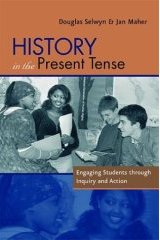 In this practical guidebook, Douglas Selwyn and Jan Maher propose a different way of teaching history — start from today and keep asking questions. As students investigate possible answers, they make connections across miles and centuries. Along the way, they experience that essential insight of the social studies: Point of view has everything to do with how one perceives the world. To this end, each chapter explores a particular kind of project that is centered on students’ concerns, but connected to core curriculum content and concepts in history, geography, civics, and economics.
In this practical guidebook, Douglas Selwyn and Jan Maher propose a different way of teaching history — start from today and keep asking questions. As students investigate possible answers, they make connections across miles and centuries. Along the way, they experience that essential insight of the social studies: Point of view has everything to do with how one perceives the world. To this end, each chapter explores a particular kind of project that is centered on students’ concerns, but connected to core curriculum content and concepts in history, geography, civics, and economics.
Projects include timelines, collages, photodocumentaries, and more. While students dig deeply into issues of personal relevance, they also master the content and skills mandated in state and national standards. Students learn about history — and about themselves. [Publisher’s description.]
Reviews
“. . . a unique and imaginative approach to education, taking the student out of the textbook, even out of the classroom, into creative contact with the world outside. Students and teachers will profit immensely from its suggestions.” —Howard Zinn, author of A People’s History of the United States
“. . . smooth, entertaining, witty, and personal — just the right combination of methods, social analysis, and philosophy of history for my secondary certification students.” —Susan Starbuck, Professor, Antioch University Seattle, author of Hazel Wolf: Fighting the Establishment
“. . . a student-centered, intellectually invigorating, content-open way to engage students in the study of history.” —Tarry Lindquist, quthor of Seeing the Whole Through Social Studies, Ways That Work and Social Studies at the Center
Table of Contents
|
Preface Reflections on understanding the past, participating in the present, and facing the future. |
|
| Acknowledgments | |
|
Introduction: The Politics of Pronouns If we are the people, who are they? This introductory personal essay sets up the guiding question of this book: How can we (the teachers) help our students to discover their own active place in history? |
|
| Whose World-Class City Is This? | |
| Whose Country Is This? | |
| Whos World Is This? | |
|
1: The Timeline of Our Lives Taking our cue from the White Queen in Through the Looking Glass, we start in the present to consider the past. |
|
| The Importance of Connected, Meaningful Narrative | |
| Building Connections With Timelines | |
| The Bridge to the Twenty-First Century and Beyond | |
|
2: I, Witness to History Whose history is it, anyway? Where we stand (or sit) determines much of what we see and how we see it. |
|
| The History of the Class | |
| Fostering Thinking Skills | |
|
3: Lenses The way we interpret events has much to do with our ideologies: both the ones we’re aware of and the less conscious ones. |
|
| Making the Lenses Visible by Creating Collages | |
| Biased for Inclusion and Complexity | |
| Appendix: Quotations About Revolution | |
|
4: Trading Stories Taking inspiration from the poet Blake, who found the universe in a grain of sand, we can discover the world in ordinary household objects. |
|
| A Product Research Project | |
| Project Overview | |
| Product Research Reports | |
| Appendix A: Learning Guidelines/Information Sheet | |
| Appendix B: Rubrics for Research Projects | |
|
5: The Media: Servant of (Too?) Many Masters The role of a free press that costs money. |
|
| Price Tags on a Free Press | |
| Which Master, or Masters, Do the Media Really Serve? | |
| Ownership of the Media | |
| The Media and the Public’s Need to Know | |
| When I’s Not in Your Schedule, But It Is in the News | |
| Learning It by Doing It | |
| Mass Communicating—”A Powerful New Force” | |
|
6: Picture This: Photodocumentaries Photodocumenting our lives. |
|
| In the Classroom | |
| Photodocumenting | |
| A Picture of Our Times | |
| Photographic materials | |
| Videodocumentaries | |
| Learning to See Changes Us | |
|
7: Making History Starting with the students, starting with now. |
|
| Students As History Makers | |
| Flexibility Is Our Motto | |
| Multiple Payoffs | |
| Skills for Readers’ Theater Formats | |
| Shakespeare’s Stage Theory | |
| Additional Resources | |
| Glossary | |
Sample Chapter
ISBN: 9780325005706 | Heinemann







Twitter
Google plus
LinkedIn